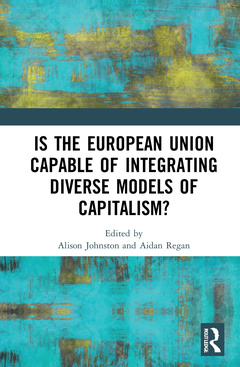Is the European Union Capable of Integrating Diverse Models of Capitalism?

The 2009 European sovereign debt crisis and the EU?s policy response to it have prompted scholars to re-think whether diverse national models of capitalism can thrive within the European Union (EU). Are some national economic systems better suited to adapt to European integration than others, and if so, why? Contributions within this volume provide a qualified yes to these questions raised, concluding that the EU favors export-led growth models while it penalizes and discourages domestic consumption-oriented growth paths, particularly those that are financed by debt-accumulation. The book questions whether the EU is capable of integrating these diverse capitalist regimes.
This volume adds a comparative capitalism perspective to EU integration scholarship in order to demonstrate that ever-closer union is not capable of accommodating diversity in national economic institutions. Chapters in this volume provide an innovative framework for understanding what factors related to European integration impede the economic and political integration of diverse European market economies. While recent comparative capitalism literature highlights that European monetary integration has favored export-led growth regimes, contributions in this volume outline that the EU?s prioritization of export-led growth over domestic-demand led growth is present in other facets of integration, including EU accession, financial integration, the free movement of people, fiscal governance and the Europe 2020 growth strategy.
The chapters in this book were originally published as a special issue of New Political Economy.
Introduction: Is the European Union Capable of Integrating Diverse Models Of Capitalism?
Alison Johnston and Aidan Regan
1. Better Than the Euro? The European Monetary System (1979–1998)
Martin Höpner and Alexander Spielau
2. Exporting Assets: EMU and the Financial Drivers of European Macroeconomic Imbalances
Gregory W. Fuller
3. The Political Economy of Austerity in Southern Europe
Sofia A. Perez and Manos Matsaganis
4. Skill Formation, Immigration and European Integration: The Politics of the UK Growth Model
Steve Coulter
5. Celtic Phoenix or Leprechaun Economics? The Politics of an FDI-led Growth Model in Europe
Aidan Regan and Sam Brazys
6. European Integration, Capitalist Diversity and Crises Trajectories on Europe’s Eastern Periphery
Dorothee Bohle
Alison Johnston is Associate Professor and the U.G. Dubach Chair in Political Science in the School of Public Policy at Oregon State University, Corvallis, USA.
Aidan Regan is Associate Professor in the School of Politics and International Relations at University College Dublin, Ireland, and the director of the Dublin European Institute.
Date de parution : 09-2023
17.4x24.6 cm
Date de parution : 03-2021
17.4x24.6 cm
Thèmes d’Is the European Union Capable of Integrating Diverse... :
Mots-clés :
Current Account Balance; Internal Devaluation; EU's policy response; Growth Regimes; EU accession; UK’s Growth; Capitalism; Em; Fiscal governance; ECB; European market economies; UK Labour Market; FDI Sector; Em Country; Comparative Capitalism; Exchange Rate Adjustments; Successive UK Government; Fiscal Consolidation; FDI Project; EU’s Skill; Low Wage Immigration; UK’s Technology; UK Capitalism; Nominal Exchange Rate; Europe’s Eastern Periphery; Export Led Growth Models; Eurozone Periphery; German Government; Macroeconomic Imbalance Procedure



